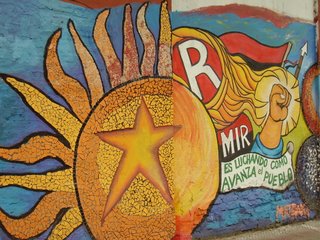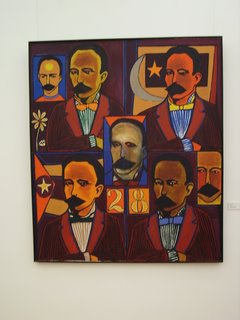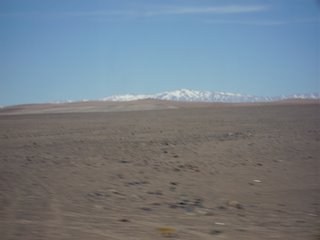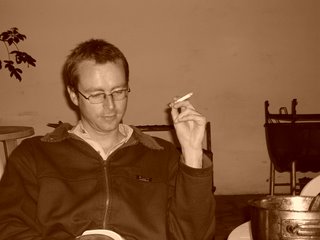Letter from SucreFor the next four weeks we will be staying in the Bolivian capital, Sucre, where we are taking a spanish language course. Espanol es muy dificil and is a daily struggle. But we are both improving after only a few days of classes (Ruth perhaps slightly more than Simon!).
But another kind of struggle on an admittedly far grander, social scale is occuring in Bolivia at the moment. The country is in the midst of a national revolution that is bringing the country's working people and centuries oppressed indigenous majority to the forefront of political life. We hope to be able to write some articles and impressions of this emerging revolution in the coming weeks. But until our spanish improves a little bit we'll be forced to rely on English language newsreports to work out what is going on. The best site we've encountered analysing the revolutionary process in Bolivia can be viewed at
www.boliviarising.blogspot.com. This is a relatively new site but is growing fast and is updated very regularly. Green Left Weekly
www.greenleft.org.au is also useful source of Bolivia information with new articles about Bolivia uploaded weekly. Other english language sites include
www.boliviasolidarity.org (not very much info up there at the moment) and the links to Zmag, UpsideDownWorld and The Democracy Centre which can be found at the Bolivia Rising website.
Today in Bolivia indigenous activists have enforced a total blockade of the cities of Cochabamba and Santa Cruz (the country's second and third largest cities). Their protest is an immense countermobilisation in response to a 'strike' last week led by conversative forces in an attempt to derail the radical constitutuent assembly process. Meanwhile a major miners strike is underway near La Paz, while a bus strike has also affected the whole country.
Below is an article from the cochabamba based Democracy Centre covering the first nine months of Bolivias revolution. while the article has some faults it gives a good summary of the major poltical trends and events since the popular movement kicked out the unpopular pro capitalist Mesa goverment up until today.
more articles and photos to come.
···········································································
BOLIVIA'S POLITICAL REVOLUTION – NINE MONTHS ON
It really was a dramatic and hopeful beginning that cold January weekend when Evo Morales took over the presidency of Bolivia. Standing atop 1000-year-old pre-Inca ruins at Tiahuanaco, Morales received a blessing of his powers from leaders of the indigenous communities of Bolivia's highlands, in a ceremony that hadn't been held in 500 years. His formal inauguration in the Bolivian Congress drew nearly a dozen heads of state, from Chile to Slovenia. Knock-off copies of the new president's red and blue horizontal striped sweater sold briskly on the internet. His picture graced page one of the Washington Post. "Evo Mania" took Bolivia and the world by storm.
In the months since, Bolivia has developed a whole new tourism industry of filmmakers, journalists, academics, and revolution-seekers who want to see close-up what they think is some new form of democracy by the people taking shape in the Andes. If they look close, and with their eyes wide open, they can see a new government that really does inspire great hope among people long-marginalized by both politics and economics. They can also get a really good lesson in how hard it is to convert the romance of hope into the far less romantic task of governing a nation.
"THIS GAS IS THE PROPERTY OF THE BOLIVIAN PEOPLE"
On May 1 Evo Morales stepped out onto the balcony of the Presidential Palace in La Paz, just across the street from where one of his predecessors had been hung to death from a lamppost sixty years before. Before a massive crowd cheering from below, Morales announced a presidential decree "nationalizing" the vast oil and gas reserves that had been privatized into the hands of corporations like Enron a decade before. "For more than 500 years, our resources have been pillaged," Morales declared. "This has to end now." Then, in a grand gesture that was pure domestic political photo-op, Morales sent Bolivian troops to the nation's oil fields to "protect" them.
Even though the soldiers left soon after CNN's cameras did, and even though the decree itself was far more moderate than many expected, many in the foreign press had a field day. Bolivia had "seized" foreign assets, wrote major news outlets. Foreign analysts declared that Morales had "been conned by Castro and Chavez" and predicted that foreign investors would flee the nation.
In fact, Morales' decree was far from a classic "nationalization". As a taxi driver in my neighborhood, Enrique, noted to me afterwards, "It's not nationalization. If it were, then the companies wouldn’t still be operating here. But that's okay. We need to negotiate with them. If we just kick them out they'll sue us."
The new plan did three basic things: it declared the government's intent to buy back a majority controlling stake in the companies given away by Morales' predecessors; it began a process of renegotiating the country's contracts with foreign oil firms; and it increased steeply the taxes foreign oil companies would pay. Economic Nobel laureate Joseph Stiglitz flew to Bolivia to endorse the plan, calling it, "a matter of fairness."
Five months later, however, the gas plan is in trouble. On the one hand, public support for the decree remains high and, just last week, the national treasury collected a check for more than $32 million from a French oil firm as part of the new tax scheme. On the other hand, the government recently announced that, because of a lack of funds, it will have to slowdown its takeover plans by the newly constituted public gas company. And the head of that company, along with the national gas minister – the country's two most important gas officials – have both resigned in the face of charges of incompetence and scandal.
Herein lie two of the biggest challenges faced by the new government; cash and competence.
Bolivia's hopes rely on promises, most of them concerning money – promises to boost education, create employment, and get the nation's poor the basics, like clean water. Generating the funds to reduce the nation's poverty is exactly what getting a fair share of gas profits is about, but the lag time is substantial.
So is the gap between what the new government hopes to do and its actual capacity to do so. In January I attended a meeting of senior officials trying to put together a negotiating team to deal with foreign trade agreements. The government had two options, neither of them good – rely on a well-educated elite with "free trade will solve everything" politics or a new guard dedicated to fairer agreements but with little background on the issues.
To be clear, there are many excellent and competent people in the new government, but they are stretched to the limit. I had lunch with a friend of mine last week who helps lead the new Water Ministry and he looked like he'd aged five years since January. Governing, it turns out, requires a far different set of skills than organizing a social movement and Morales and his teams are struggling to make the transition.
REWRITING THE NATIONAL MAGNA CARTA
On July 2 Bolivians went to the polls in yet another historic vote, this one to elect delegates to a national Constituent Assembly to rewrite the country's constitution. And once again Morales and his Movement Toward Socialism (MAS) party won big – a vote of more than 55%, twice that of his nearest rival. But as that Assembly starts to convene, battles over how it should function have driven the deep divides in Bolivian politics out in the open. Two weeks ago the Morales government faced the kind of massive protests he used to help organize against his predecessors.
On September 8 civic groups in four of Bolivia's nine states staged a one-day general strike and road blockade. Their rallying cry was that Morales and MAS were seeking to use the Assembly to run roughshod over their opponents. Central to that cry was a procedural matter. While MAS agreed that final approval of the new constitution would require a 2/3 vote of the Assembly (one that would require approval from at least some of their opponents), the party declared that decisions along the way could be settled by a simple majority (i.e. by Morales backers on their own).
That half the nation would shut down over a procedural numbers game is a measure of just how much is at stake. Potentially everything from land reform to a more radical form of gas nationalization could end up on the table, and the interests involved know it.
CIVIL WAR IN THE MAKING OR JUST NOISY NEGOTIATIONS?
Morales' domestic and foreign opponents have cast dire warnings that the new president is steering the nation to civil conflict. But is that what is really happening here?
At issue in Bolivia today is not just about what economic or political course the nation should take. At issue is what this moment means in the broad sweep of the nation's history. The Bolivian elite, which has held power here for decades, sees the Morales presidency as just someone else getting their turn – "Okay, now five years for you. Go ahead and make some changes, but not any big ones."
Morales and his backers see things quite differently. They see this moment as the equivalent of Nelson Mandela and the ANC taking over the reins in South Africa in 1994 – a new constitution, a new weave of power, a new nation.
They may well succeed in creating one but, as in South Africa, the job will be much harder than they anticipated. They will end up compromising more than they imagined. They will struggle with the day to day challenges of governing far more than they dreamed. They will need as much humility and self-reflection as they have had global attention. Negotiations, be it with foreign investors or domestic opponents, will be part of the deal.
At Tiahuanaco, on the eve of his inauguration Morales told his countrymen, "We are human, we will make mistakes, but when we do, refocus us, guide us for we will never betray our country." With public support that still registers at more than 60%, Morales retains huge backing from his people. How he uses that support in the months ahead will determine whether he can turn his presidency into the instrument of hope Bolivians want it to be.
 Here´s a shot of the amazing and bizarre Isla de Pescados or Fish Island in the middle of the Salar de Uyuni. We were only able to spend a day on the Salar as we had to get to Sucre to start our Spanish course but here´s a link to a stack of photos that Clair & Shaun whoe we met in Uyuni and then again in Sucre took of the Salar and a stack of other places we haven´t gone either - but inspiring photos nonetheless (think you´ll have to cut & paste, if you wanna look, i can´t get the clicky link to work!:(
Here´s a shot of the amazing and bizarre Isla de Pescados or Fish Island in the middle of the Salar de Uyuni. We were only able to spend a day on the Salar as we had to get to Sucre to start our Spanish course but here´s a link to a stack of photos that Clair & Shaun whoe we met in Uyuni and then again in Sucre took of the Salar and a stack of other places we haven´t gone either - but inspiring photos nonetheless (think you´ll have to cut & paste, if you wanna look, i can´t get the clicky link to work!:(






